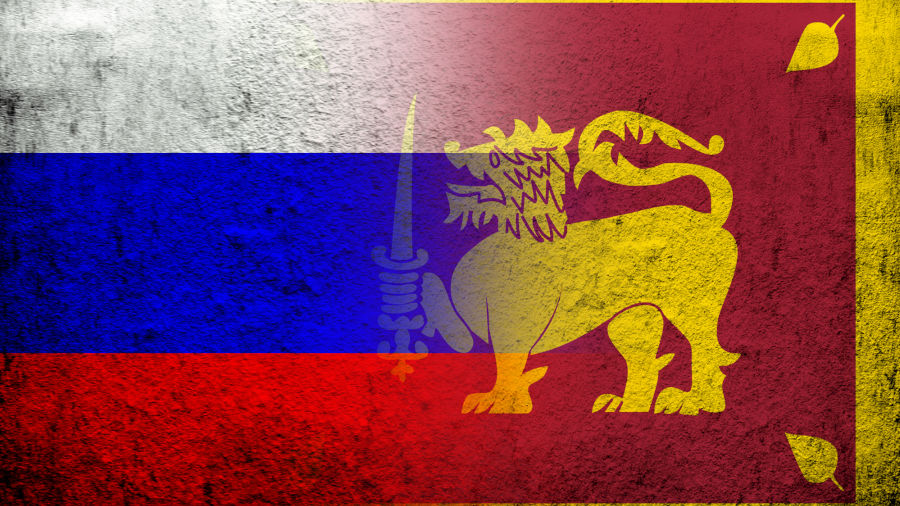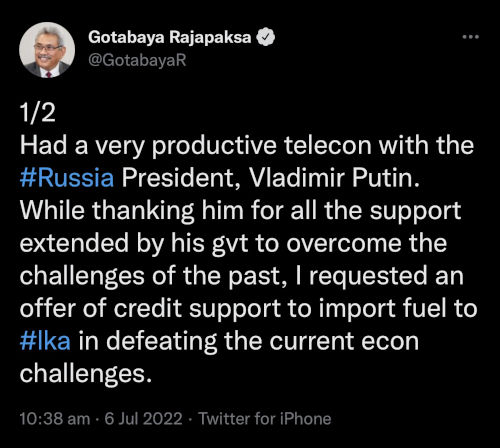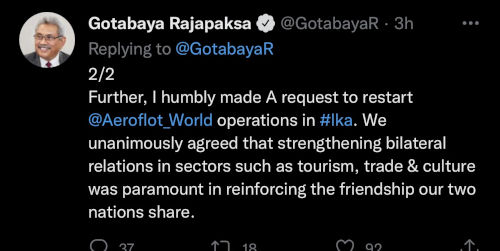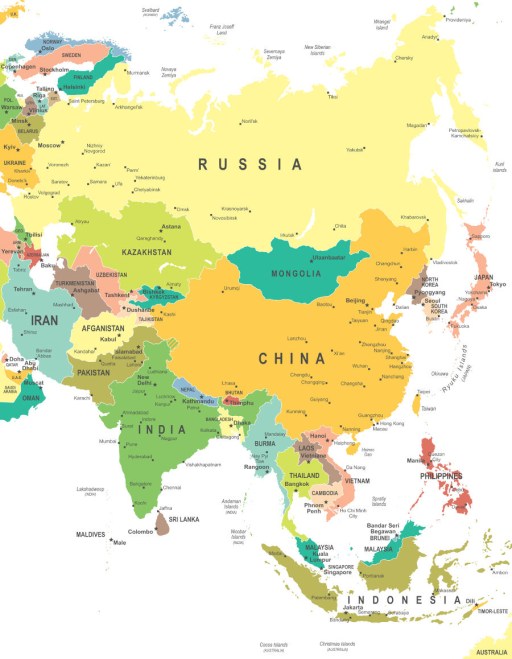Sri Lankan President Reaches Out To Putin For Economic Assistance

Proposal for an Aeroflot South Asian Regional Hub in Sri Lanka in exchange for fuel supplies
By Chris Devonshire-Ellis
The Sri Lankan President, Gota Rajapaksa, has held phone conversations with the Russian President Vladimir Putin for financial assistance. In discussions held earlier today (July 6) that Rajapaksa subsequently tweeted details of, Putin was asked to provide credit support to assist Sri Lanka solve its dire fuel import issue. The country is down to its last bare emergency reserves and the public consumption of gas and petroleum products has been effectively banned as sales have been prohibited.

The Sri Lankan economy has ground to a complete halt as all transportation infrastructure bar a handful of intercity trains running irregular hours with every other, once-a-day services. Most of the countries city and town communities have now been cut off from each other as no cars, lorries or other vehicles can run. Lankans are increasingly turning to wood burning stoves and home-produced products for food as shops are empty.
On-the-ground reports suggest that IMF and World Bank staff flown in at the invitation of the Government have been in the capital, Colombo, for the past week with nothing to do as the Government has failed to provide any supporting documentation as to the extent of debts or where money trails lead. It appears that may not be forthcoming, in the hopes that the IMF will give unconditional relief without having to provide evidence of previous financial affairs. The reach out to Putin suggests this may well be the case.
Rajapaksa has offered an incentive, in suggesting that Sri Lanka becomes a regional South Asian hub for Russia’s national Aeroflot airline.

There may be some merit to this idea as Sri Lanka, in addition to other Asian destinations such as Thailand, Indonesia’s Bali, Vietnam and nearby Maldives have proven highly popular with Russian tourists in the past. Direct flights from Moscow to Colombo had been common until March when both the Ukraine conflict and Sri Lanka’s debt began to make the service impractical as Sri Lanka ran out of aviation fuel. Aeroflot and its subsidiary airline, Rossiya, suspended flights to Sri Lanka in June.
However, in 2019, just pre-covid, Russian tourist arrivals to South Asia were the fastest growing European sector with a massive 54% year on year growth rate. The potential for creating a Russian regional hub is certainly there.

Pivot To Multipolarism
Meanwhile the status of Sri Lanka as a previously stalwart member of the British Commonwealth – it hosted the Commonwealth’s global CHOGM meeting in 2013 – has been shown to be driven by both an increased trend towards domestic autocracy under the guise of democracy, where democratic values and processes have been used to subvert and redirect Sri Lankan assets to autocratic individuals.
For example, the Rajapaksa family have had 20 members holding Ministerial positions in addition to senior executive roles within its state-owned companies for well over a decade, as have other prominent Sri Lankan political families. The result has been a country whose people possess democratic values yet who now find themselves in debt to the tune of an estimated US$51 billion and presided over by a President who refuses to leave despite mass rallies calling on him to do so, and who has issued ‘shoot on sight’ orders against protestors.
The UK has partly itself to blame as checks and balances over the years appear to have missed any red flags over what has been going on. As a consequence, Sri Lanka can now be classified as a non-Western allied state with a preference to turn now to Russia. That can also be taken as a signal that Rajapaksa subscribes to the ‘multi-polar’ global structural system rather than the West’s apparent ‘unipolar’ model, centred around the United States, however in Rajapaksa’s case it is much more likely to be a case of bending political agendas to whoever has the most money.
Russia of course is not generally to be trifled with and appears to have very able economists on board – the country has constantly been able to deal with the vast array of economic sanctions imposed upon it this year. Russia is therefore unlikely to lend money to Sri Lanka as it knows that the country has defaulted and has a long list of existing creditors to whom it owes money. Putin will not want to join that list.
That said, a Russian regional air transportation hub and the financial support for that may well prove appealing. But if Rajapaksa wants to use the money for such a concession in order to pay for imported fuel, he will need to deliver on his promises. Russia does no take kindly to individuals or countries that break their promises.
Related Reading
About Us
Chris Devonshire-Ellis is the Chairman of Dezan Shira & Associates. The firm assists British and Foreign Investment into Asia and has 28 offices throughout China, India, the ASEAN nations and Russia. For strategic and business intelligence concerning China’s Belt & Road Initiative please email silkroad@dezshira.com or visit us at www.dezshira.com





